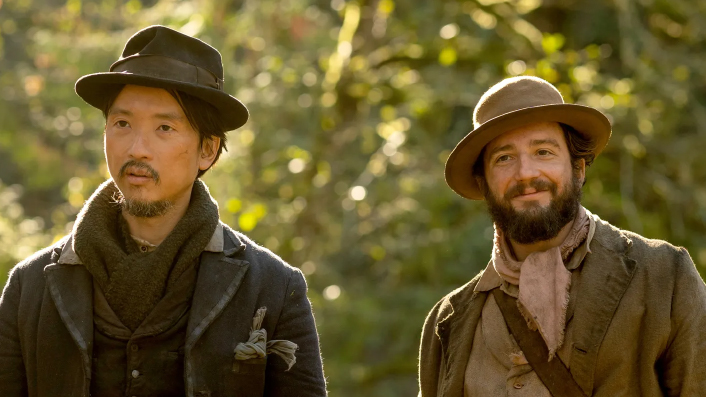The low-key, patient chemistry of First Cow yields the year’s most singular bromance

Kelly Reichardt’s acclaimed drama First Cow finally makes its way to Aotearoa cinemas this week. It’s a kind vision of a frontier dream that elegantly addresses class imbalance and the corrupting influence of colonialism and greed with wry, subtle humour and genuine empathy for its characters, writes Aaron Yap.
Since her scrappy 1994 indie debut River of Grass, Kelly Reichardt has steadily amassed a body of work that has established her as one of American filmmaking’s most distinctive voices. Particularly centred on oft-forgotten characters who exist on the peripheries of society, Reichardt’s films are often spare, rigorously minimalist works of social realism.
See also:
* Movies now playing in cinemas
* All new streaming movies & series
First Cow returns to the frontier territory of 2010’s period piece Meek’s Cutoff, and once again reinforces her as a poet of earthy grace, capable of spinning musty Western myths—and their accompanying landscapes—into deeply humane, occasionally enigmatic parables of generosity and compassion.
Adapted from Reichardt’s regular writing collaborator Jonathan Raymond’s novel The Half-Life, this is perhaps her tenderest, warmest picture to date. The film functions equally as a buddy flick, a stealthy caper thriller, and a sensitive immigrant story that transports the viewer into the race and class divide of the Pacific Northwest in the 1800s.
Our protagonists are far from commonly depicted masculine paragons of the Old West: Otis “Cookie” Figowitz (John Magaro) is a soft-spoken chef for a band of boorish fur trappers; King Lu (Orion Lee) is a crafty Chinese immigrant who’s on the run from the Russians after killing a man. Through a series of chance encounters, a friendship is forged that soon blossoms into a business partnership.
Combining Cookie’s culinary gifts and King Lu’s entrepreneurial smarts, they hatch a shrewd get-rich scheme to bake and sell “oily cakes”—a type of honey-drizzled doughnut—to frontiersmen on the Oregon Trail.
The catch? One of the key ingredients of their fast-selling pastries is secretly sourced from the titular bovine, the only one in the region, and the prized possession of an affluent British private landowner, Chief Factor (Toby Jones). The narrative gains a gently thrumming air of suspense when the amusingly oblivious Factor takes a liking to their sweet treats, forcing the pair to weigh up the risks against the rewards of their opportunistic pursuits in the “land of riches”. “This is a dangerous game we’re playing”, King Lu acknowledges, unknowing that they’re already contributing to, and have become ensnared in, capitalism’s tightening grip.
Decidedly moulded from the revisionist anti-Western contours of a McCabe and Mrs. Miller, First Cow is a wonderful showcase of Reichardt’s invigoratingly clear-eyed and understated register. It’s a kind vision of a frontier dream that elegantly addresses class imbalance and the corrupting influence of colonialism and greed with wry, subtle humour and genuine empathy for its characters.
The low-key, patient chemistry between Cookie and King Lu surely yields the year’s most singular bromance. Both Magaro and Lee’s work is so quietly captivating it’s not a wonder that they’ve flown somewhat under the radar and gone unrecognised during awards season.
Contributions elsewhere help bathe the film in a tranquil, deceptively simple glow: Christopher Blauvelt’s cozy, painterly, but never ostentatious, Academy ratio lensing; the rueful drift of William Tyler’s folksy finger-plucked guitar score. First Cow is almost unusually blissed-out. I’d be content staying in this world for another hour, watching the boys milk Evie, peddle buttermilk biscuits, and perhaps making enough to open a hotel somewhere down the line.

















